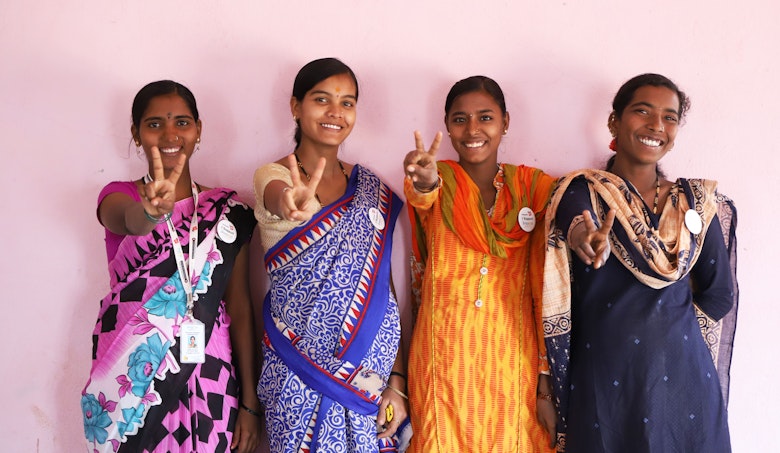IMAGE: Empowering early married girls in India
Every year, 1.5 million girls in India marry before the age of 18. Many girls forced into early marriages rarely go to school. They live in poverty, often abused by their husbands. Our IMAGE programme empowers these girls and makes them stronger. We help them stand up for themselves. We offer them a place for professional skills training. We educate their communities to better protect them.
Thangam Ponpandi
Country Manager India
Background
|
At 230 million, India accounts for the world’s highest number of early married girls. In large parts of rural India, it is a custom for girls to marry before 18. Poverty, lack of awareness and tradition are some of the main reasons. Marrying young has enormous disadvantages. The girls have children early and face severe health complications. They even discontinue their schooling. This keeps them from earning an income, making them financially dependent and in some cases forcing them to put up with domestic abuse. Girls from broken child marriages often end up on the street. They are highly vulnerable to sexual exploitation. |
Goal
Our IMAGE programme seeks to empower girls who have married young. We help them play bigger roles in their communities, to be seen more. Yet, we also ensure they stay safe and are no longer vulnerable to exploitation. We campaign for the abolishment of child marriages.
Approach
The acronym IMAGE stands for the Initiative for Married Adolescent Girls' Empowerment. Started in India, IMAGE aims to empower married girls, giving them a say. That way they can stand up and better care for themselves.
IMAGE helps girls defend their rights. Through meetings, we raise awareness about health, nutrition and how to better care for their own children.
IMAGE focuses on the southern state of Karnataka, where 23% of Indian child brides live. In March 2021, 15,406 early married girls were identified during a so-called baseline survey by Terre des Hommes.
Results
Early married girls access education, health care (specifically sexual and reproductive health and rights) and are protected from gender-based violence. Families and community members are also sensitised on the ill effects of child marriage.
Latest news
Annual report 2023
In 2023, we collaborated with many stakeholders to work with us towards our ultimate goal; stopping child expl…
Anne Priya : A story of Women Empowerment
This International Women's Day, we share the story of Anne Priya, our Programme Manager from India who leads t…
The Global Research Agenda
On February 1 2024, the Terre des Hommes Netherlands Global Research Agenda was launched, which will guide our…
Regional Factsheets Asia
In 2022-23 we reached out to 57,972 children in the Asia Region. Our Asia Regional Factsheets present our work…
Technology teaches Salma about Sexual and Reproductive Health
Once a bright student, Salma's future was jeopardised when she was married off at the age of 17 due to her fam…
Annual report 2022: concrete results for children
Thanks to the support of donors, in collaboration with partners and the commitment of volunteers and staff, Te…
Roopa's Story: Fighting Against Child Marriage in India
Roopa shared, "One day, I was at school, and the next, I found myself dressed in a saree and jewellery to get…
India Annual Report 2022
In India, Terre des Hommes Netherlands addresses child labour, child sexual exploitation, child marriage and o…
Nisha’s inspiring journey: from distraught child bride to movement leader
At 13, Nisha was forced to marry an 18-year-old from a nearby village, as her parents did not earn enough to r…
Mala’s mistakes do not define her
For many children around the world, making a mistake is part of a learning process. These mistakes are often m…
A Child-Led Research to Assess COVID-19’s Impacts
Ten million additional child marriages may occur before the end of the decade, threatening years of progress i…
Annual report 2020
Without a doubt 2020 is the year of the corona pandemic. And yet there is much to be proud of!
Partners
Children of India Foundation is the lead organisation of this programme.
Implementing partners include: VIDYANIKETHAN, Child Rights Trust (CRT) , PMSR , SEVAK - Society for Empowerment through Voluntary Action in Karnataka , REACH - Rural Environmental Awareness Community Help , Arpanam Trust

